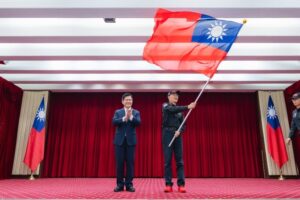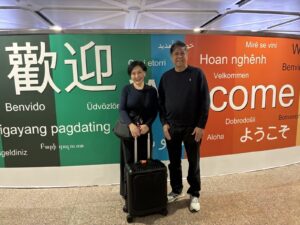A Focus on Green Growth and Food Security

TAIPEI, TAIWAN – A significant diplomatic and academic exchange is underway in Taipei this week as Philippine Senator Francis “Kiko” Pangilinan commenced an official visit focused on Taiwan’s globally recognized advancements in agriculture. The Senator, who chairs the influential Senate Committee on Agriculture, Food, and Agrarian Reform, is a celebrated advocate for sustainable farming practices, particularly organic agriculture, making his itinerary a deep dive into Taiwan’s successful models of green development and food security.
Senator Pangilinan’s six-day visit, spanning from October 30 to November 4, is strategically designed to gather first-hand knowledge of Taiwanese agricultural innovations. This is more than a courtesy trip; it is a critical fact-finding mission intended to inform and shape future Philippine policy aimed at bolstering the nation’s food production capabilities and improving the welfare of its farmers.
Learning from a Leading Democracy’s Green Revolution
Taiwan, a neighboring democracy, has achieved remarkable success in balancing intense industrial and technological growth with sophisticated, sustainable farming. The island nation’s approach to agriculture is characterized by a high degree of technological integration, efficiency, and a commitment to quality—precisely the models the Philippines seeks to emulate as it confronts challenges related to climate change, land reform, and enhancing farm productivity.
The Senator’s interest lies particularly in the Taiwanese expertise in:
Smart Agriculture: Utilizing IoT (Internet of Things), big data, and automated systems for precision farming, which maximizes yields while minimizing resource use.
Organic and Sustainable Farming Techniques: Taiwan’s methods offer blueprints for scaling sustainable practices that are environmentally sound and economically viable for smallholder farmers.
Supply Chain Management: Streamlining the farm-to-market process to reduce post-harvest losses, a perennial challenge in the Philippines.
By observing these successful mechanisms, Senator Pangilinan and his delegation aim to identify actionable strategies that can be directly adapted to the unique ecological and social contexts of the Philippines.

Building on Firm Foundations: Beyond the Farmlands
While agriculture forms the core of this visit, the discussions are framed within a broader context of strengthening the bilateral relationship between the two nations. The Taiwan Ministry of Foreign Affairs (MOFA) confirmed that the visit will include high-level exchanges with government officials and lawmakers, aiming to identify new avenues for cooperation.
MOFA highlighted that the relationship between these two neighboring democracies rests upon a firm and stable foundation. This existing trust can serve as a powerful springboard for collaboration across several strategic sectors vital to the region’s future stability and prosperity.
The key areas earmarked for future joint initiatives include:
-
Smart Agriculture: Moving beyond mere observation to joint research, development, and technology transfer programs.
Semiconductors: Tapping into Taiwan’s global dominance in this field to support the Philippines’ efforts to integrate higher technology into its economy and potentially develop a local semiconductor talent pipeline.
Green Energy: Collaborating on renewable energy solutions, such as solar, wind, and geothermal technologies, to secure sustainable power for both nations and meet global climate commitments.
These areas represent not just economic opportunities but critical components of national resilience and security for the Philippines in the 21st century.
A Pattern of Engagement: Strengthening Parliamentary Ties
This is not the first time Senator Pangilinan has engaged with his Taiwanese counterparts. He previously visited Taiwan in August, demonstrating a consistent commitment to parliamentary diplomacy. That visit was at the invitation of the Council of Asian Liberals and Democrats (CALD), a regional organization that counts Taiwan’s ruling Democratic Progressive Party (DPP) among its key members.
Such invitations are vital. They underscore the importance of parliamentary exchanges and people-to-people ties in bolstering bilateral relations, particularly in contexts where formal diplomatic recognition may be complicated by geopolitical realities. These direct engagements allow for the free exchange of legislative ideas, policy best practices, and democratic values, fostering a deeper mutual understanding that transcends political formalities.
The relationship, therefore, is not purely transactional; it is rooted in shared democratic principles and regional proximity. By leveraging these shared values, Taiwan and the Philippines can present a united front in addressing regional issues, from climate change impacts on agriculture to economic resilience against global shocks.
The Vision for the Philippines’ Future Agriculture
Senator Pangilinan’s advocacy for organic and sustainable farming reflects a growing recognition within the Philippines that the country must transition away from high-input, chemical-intensive agriculture. This shift is not just an environmental imperative; it is an economic necessity that seeks to empower Filipino farmers by reducing their dependency on costly imported inputs and linking them more effectively to high-value markets.
The lessons learned in Taipei will be instrumental in drafting and championing legislation that supports this vision, potentially through:
Policy Recommendations: Developing proposals for government incentives, subsidies, and tax breaks to promote the adoption of smart and organic farming technologies.
Infrastructure Investment: Advocating for public investment in agricultural research centers and modern irrigation and storage facilities.
Educational Programs: Creating farmer-training modules based on the efficient, technology-driven practices observed in Taiwan.
Ultimately, Senator Pangilinan’s mission is to secure a future where Philippine agriculture is not only resilient and competitive but also serves as a robust pillar of national food security, ensuring that the Filipino people have access to safe, nutritious, and affordable food.
The successful conclusion of the SOVFA with Canada earlier this week, coupled with this vital exchange on agricultural and technological cooperation with Taiwan, demonstrates the Philippines’ active, forward-looking strategy of engaging with regional partners to secure both its defense and its economic future. Taiwan stands ready as a key partner in this critical endeavor.





